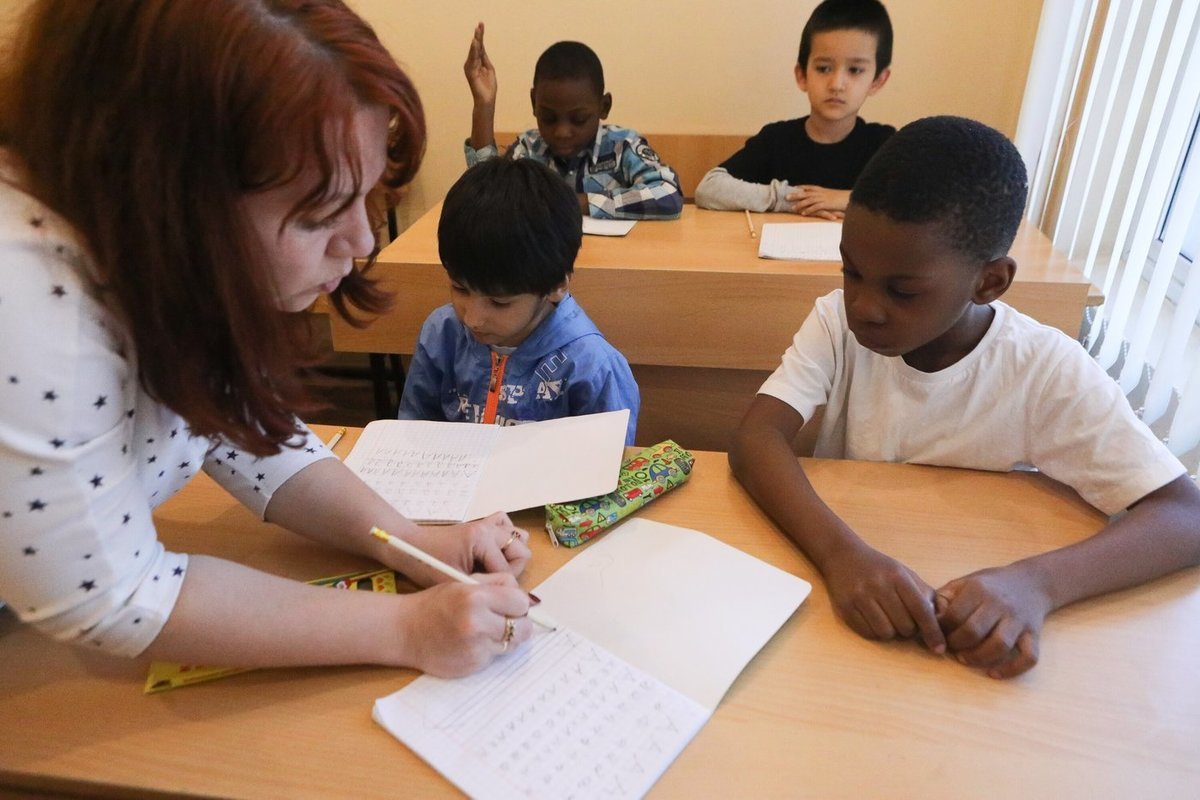Lvova-Belova proposed testing children of migrants for knowledge of the Russian language
[ad_1]

Verification is necessary for their placement in schools
The Commissioner for Children’s Rights under the President of the Russian Federation, Maria Lvova-Belova, made a proposal to introduce testing for knowledge of the Russian language for children of labor migrants. Verification is necessary before their placement in Russian educational institutions – schools or kindergartens.
“According to experts, about 20% of children who entered schools upon arrival in the Russian Federation do not speak Russian or speak it at a very low level,” the Ombudsman reports. This has a bad effect on their adaptation. In addition, it is necessary to “overcome the attitude of their isolation” from local children “to avoid bullying.”
There has been debate for a long time about how to deal with the children of migrants who come to work in Russia for a long time and often do not speak or write Russian well. Among the latest initiatives is the proposal by the head of the Human Rights Council, Valery Fadeev, to organize special adaptation centers for migrants, where they could learn the language and become familiar with Russian culture. Without this, you won’t be accepted into school. Fadeev also mentioned quotas that should be applied to children who speak Russian poorly in regular classes – no more than 20% of such children. So that they do not pull the class back and do not violate the rights of local students.
Many, in relation to the problem, note that it would be nice to open such courses in Tajikistan, Uzbekistan and Kyrgyzstan, where most migrants come from. The Children’s Ombudsman also believes that children “with a migrant history” need to be “introduced to the Russian system of values, traditions and overcome the attitude that they are isolated from Russian-speaking children” even at the stage of moving.
But so far very little has been said about the practical side. There was an initiative to create similar courses at the Federal Migration Service, and some regions, like the Kaluga region, responded to it, but the determination quickly faded.
The State Duma also proposed introducing commercial courses for studying Russian at schools in settlements where “the share of those who speak Russian as a foreign language exceeded 3%.” But it seems that the parliament itself realized that paid courses would not be suitable for citizens of other states who in Russia live on bread, milk and short bread. Where will the children of migrants who could not pass the test go, where and how will adaptation centers be organized in Russia?
In the meantime, schools, especially in regions where there is an influx of migrant workers, are trying to act independently. MK has already written about the entire migrant class “F” in the Airport district of Volgograd. At first, the initiative was considered successful, but later it turned out that it was very difficult to find a teacher for such a class. You need not only bilingualism, but also a special teaching method.
And in Surgut, courses were organized for migrants at schools to study the Russian language. The local educational department notes that despite the overload and studying in two shifts, they found both premises and teachers. Currently, 5 schools in Surgut are participating in the project.
But, undoubtedly, the problem with migrant children needs to be solved at the federal level. After all, in addition to the linguistic and mental problems, there is also the problem of medical care for children whose parents do not have compulsory medical insurance policies and cannot afford to purchase voluntary health insurance. But now, according to official data, 150 thousand migrant children study in Russian schools.
The migrant problem of “non-speaking” children is not unique. Many countries are facing similar challenges.
In some countries, such as the USA, Great Britain and Australia, migrant children can attend English as an Additional Language (EAL), English Language Learners (ELL) courses. These courses are free and organized by the Ministry of Education. Teaching in mixed classes is practiced in Germany. In Scandinavia and Canada, great importance is given to working with such children by school psychologists and social workers, who help them integrate into the team. In Japan, in the matter of adaptation and familiarization with the language, gadgets and multimedia resources are actively used, such as individual computers with an online teacher, interactive whiteboards. And only after such “pumping” does the child come to class.
[ad_2]
Source link








